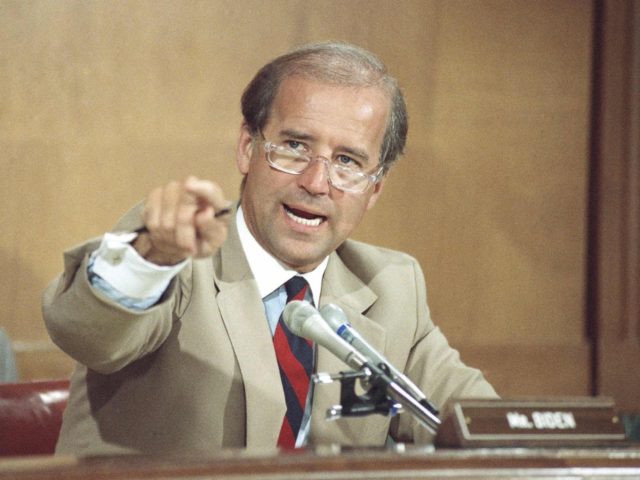Former vice president Joe Biden “supercharged” America’s devastating opioid crisis through policies he backed as a U.S. Senator, cracking down on overdose prevention sites and making it riskier to call 911 if someone overdosed.
Biden also made racial disparities in sentencing worse by leading legislative efforts to punish the use of crack.
That is the conclusion of an extensive report by Zachary Siegel on Thursday in Politico, which documents Biden’s leading role in the “War on Drugs” over nearly four decades in the Senate — and the public health consequences.
Politico reported (original links):
In Philadelphia, where Penn is located and Biden’s presidential campaign is headquartered, activists and public health workers actually laid the groundwork for what would be the nation’s first overdose prevention site. But earlier this year, federal prosecutors in Pennsylvania filed suit against Safehouse, the nonprofit organization formed to run the location, preemptively acting to prevent the overdose prevention site from opening. To block it, the law they cited was an old provision of the Anti-Drug Abuse Act of 1986, known as the “crack-house statute,” which Biden co-sponsored.
…
Far from simply being a relic of the crack era, Biden expanded the statute in the early 2000s by authoring the Reducing Americans’ Vulnerability to Ecstasy, or RAVE Act, in response to fears about the use of MDMA, also known as Ecstasy, at raves. Whereas the crack-house statute originally applied to permanent locations, Biden’s RAVE Act—which was signed into law in 2003 as a section of the PROTECT Act—expanded the provision to allow prosecutors to go after the operators of temporary locations where drugs happen to be consumed, like the owners of warehouses or fields where music festivals are held [including Burning Man].
…
In the absence of such locations, what happens when someone doesoverdose on opioids? If they’re fortunate enough to be around someone else at the time, that person might call 911. Or they might not—especially if they are also using drugs or provided them to the person who overdosed. Research shows that the number-one reason people cite for not calling 911 for help during overdoses is the possibility they’ll face criminal charges. And that’s a fear that exists in large part thanks to another law co-authored by Joe Biden—a crack-era provision that, along with copycat legislation at the state level, is part of what is collectively known as the “Len Bias Laws.”
…
The original intent of the legislation was to enhance the sentences faced by major drug traffickers and so-called kingpins whose products had destroyed the lives of addicted people. But the law has instead had the effect of turning accidental overdoses into homicides—and, in so doing, discouraging people who use drugs from calling for emergency services if they’re around someone who overdoses and needs emergency medical attention. … Biden’s legislation not only led to the prosecution of addicted people and their friends and family, but also exacerbated existing racial disparities in incarceration.
Politico notes that the impact of the opioid crisis has been worst in white, working-class regions of the country where Biden is hoping to have his greatest political appeal.
Biden has, belatedly, acknowledged his role in the drug crisis — including heavier sentences for crack than cocaine. In a speech earlier this year to the National Action Network, run by Al Sharpton — a racist and antisemite whose support every major Democratic presidential candidate is courting — Biden acknowledged that error, claiming that he tried to address the disparity in sentencing as vice president. Siegel notes that the Obama administration merely reduced, but did not eliminate, the sentencing disparity.
Biden’s campaign, responding to Politico, blamed the failure of Biden’s drug legislation to the Republican takeover of Congress in 1994, which they say resulted in less funding for drug courts and drug treatment.
Read the full Politico article here.
Joel B. Pollak is Senior Editor-at-Large at Breitbart News. He is a winner of the 2018 Robert Novak Journalism Alumni Fellowship. He is also the co-author of How Trump Won: The Inside Story of a Revolution, which is available from Regnery. Follow him on Twitter at @joelpollak.

COMMENTS
Please let us know if you're having issues with commenting.